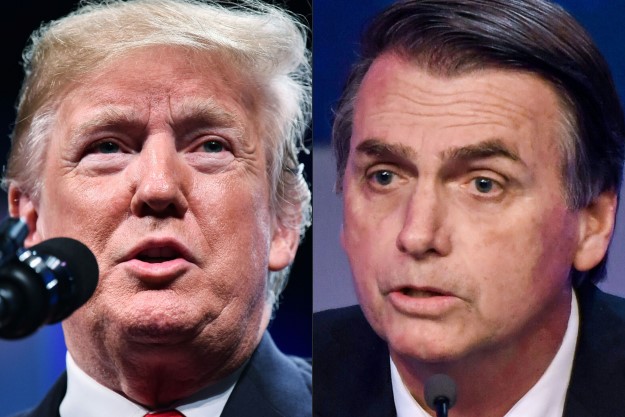When Donald Trump and Jair Bolsonaro convene in Washington next week they will “shake the earth,” a high-ranking diplomat involved in preparing the meeting privately promised last week.
Indeed, in several ways, the encounter is set to be revolutionary. When Bolsonaro announced his trip on Twitter, supporters began posting pictures of the two presidents dressed as action heroes and images of Brazilian and American flags fluttering side by side. Never before has a Brazilian president associated himself so closely to his U.S. counterpart, ranging from his use of social media, nostalgia for past glory and disdain for checks and balances, mainstream media, climate change, socialism and minorities. Bolsonaro’s Foreign Minister Ernesto Araújo famously argued that only Trump could “save the West.” And Bolsonaro’s foreign policy is built around one single promise: to transform the United States into Brazil’s key partner.
Yet, a dynamic that has become a hallmark of this Brazilian government will also be on display in Washington: the anti-globalist, pro-Trump faction of the Bolsonaro administration, which includes his foreign minister, will clash with the more prudent generals, led by Vice President Hamilton Mourão, and the technocrats, represented by the Economy Minister Paulo Guedes and Justice Minister Sérgio Moro. While Mourão will not be at the meeting, it wouldn’t be surprising to see him publicly contradict Bolsonaro while the president is traveling, as he has continuously done over the past few months.
What concrete decisions can we expect to see? Here are some of the topics that are likely to be included in the Trump – Bolsonaro agenda:
Venezuela:
How to address the crisis in Venezuela is certain to be part of the conversation. While Araújo’s early comments about radical alignment with the United States raised hopes in Washington that Brazil would side with Trump no matter what – including stationing U.S. troops if a military intervention were to take place – Mourão has firmly rejected such possibility, just as he brushed aside all talk of a permanent U.S. military base in Brazilian territory. Just days before Bolsonaro’s trip, Mourão seemed to reaffirm the deepening sense that he controls key foreign policy decisions when he voiced hopes about starting back-channel talks with more moderate elements of the Nicolás Maduro regime. U.S. diplomats have privately wondered whether Araújo is “all hat, no cattle” – doubting his capacity to push back against Mourão and the generals.
Defense:
The Trump administration may declare Brazil a major non-NATO ally (MNNA). The grouping includes Israel, Japan, South Korea and Australia – Argentina is the only Latin American country on the list so far. The designation opens the door to closer military ties with the U.S. and helps Brazilian suppliers join consortia and bid for some U.S. defense contracts. It is also likely to broaden cooperation in intelligence sharing and in the fight against transnational crime and drug trafficking. For Brazil, it would be a significant change in its foreign policy, largely unthinkable only a few years ago, given a traditional preference for strategic autonomy, free from constraints that alliances might imply. And yet, it’s a rather modest development when compared to what had been rumored over the past few months. More radical ideas, such as following the U.S. lead in transferring the Brazilian Embassy in Israel to Jerusalem, seem so far to have been thwarted by the moderates in Brasília.
China:
Trump is likely to ask Bolsonaro to help limit Beijing’s influence in Latin America – an idea recently voiced by Senator Marco Rubio as well. While Brazil’s president may personally agree – he criticized China in campaign speeches – Brazil’s profound economic ties to the Asian giant make opposing Beijing difficult. Pragmatists around Mourão and Guedes have convinced Bolsonaro to travel to Beijing this year – a decision opposed by Olavo de Carvalho, a far-right conspiracy theorist based in Virginia who wields significant influence over the Bolsonaro government. While Brazil-China relations have suffered somewhat under Bolsonaro, economic realities are likely to prevent a decisive move against Beijing.
Aerospace:
We are likely to see a big step forward when it comes to space cooperation, formalizing U.S. access to a launch base in Brazil’s northeast. Several U.S. companies have declared their interest, since the site would reduce fuel costs of satellite launches by 30 percent. The crucial step, a technology safeguard agreement to protect U.S. space and satellite technology, is expected to be signed during Bolsonaro’s visit. A somewhat similar agreement had been discussed by the Brazilian government in 2001, but was thwarted amid concerns over the implications for Brazil’s sovereignty. While a lot depends on the details, which have not yet been made public, the signing of the agreement could lead to greater technological cooperation in aerospace and defense. That in turn may allow Brazil to develop expertise in the area, an increasingly important asset thanks to fast growth in the microsatellite sector crucial for GPS and internet communication.
OECD membership support:
Guedes and Moro are keen on getting Trump’s formal support for Brazil’s OECD membership, which former President Michel Temer failed to obtain when he announced Brazil’s bid last year. While uncertain – Washington is reluctant to expand membership at this stage – U.S. support would be a tangible foreign policy win for Bolsonaro, and strengthen his support among liberal economists, who have recently voiced doubts about the president’s commitment to their cause.
Trade:
Optimists are also hoping for concrete steps to facilitate economic ties, yet this is where progress looks least likely. The president’s son Eduardo Bolsonaro’s promise that the United States would overtake China as Brazil’s top trading partner remains unrealistic. That is largely because Trump’s core supporters in rural areas oppose reducing tariffs for Brazilian products such as soy. Also, with Democrats in control, the House of Representatives is unlikely to support an ambitious trade deal with Brazil, leaving room only for reducing a series of regulatory hurdles – the so-called low-hanging fruit. While Bolsonaro and Trump may not make progress on reaching a double taxation treaty, the U.S. is more likely to facilitate visa procedures for pre-approved Brazilian business executives – a deal Dilma Rousseff’s government blocked because it was unwilling to share information on Brazilian citizens with the U.S. government.
Embassy tenants:
While the U.S. government is expected to delay the announcement of its new ambassador to Brazil, Bolsonaro will announce his representative in Washington during the visit. The nomination of Nestor Forster, one of the few Brazilian career diplomats whose views are closely aligned with those of Araújo and De Carvalho, would be a victory for the pro-Trump forces. The selection of Murillo de Aragão, a well-connected lawyer and business consultant, or any experienced career diplomat, would be thought seen to favor the generals and the economists in the Brazilian government.
Expectations are high. Observers will evaluate Bolsonaro’s foreign policy largely based on his capacity to transform Brazil-U.S. ties. And at a time when several political projects at home (including pension reform) face headwinds, the president faces considerable pressure to deliver.









